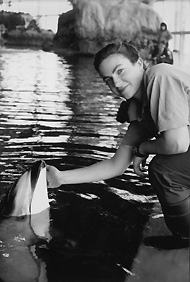![]()
Departments
![]()

|
Week of 22 October 1999 |
Vol. III, No. 11 |
Feature
Article
Eavesdropping on ancient mariners: grad's goal as veterinarian
By David J. Craig
Jen Rodriguez has trekked through rain forests, climbed mountains, and braved a week on a small boat in the Atlantic Ocean to catch glimpses of some of the world's rarest animals. But it is aquatic sounds, not exotic sights, that really capture her imagination.
"I've always loved the sounds whales make," says Rodriguez (CAS'99). "And I'd always wanted to listen to one with a hydrophone."
This summer, Rodriguez got front row seats to the music of beluga whales -- she studied their vocalizations as an intern at Shedd Aquarium, in Chicago. Rodriguez, a graduate of the Boston University Marine Program (BUMP), hopes the Chicago internship, which ended last week, has brought her one step closer to a career working with marine mammals.
|
|
|
Jen Rodriguez (CAS'99) plays
with Sira, a Pacific white-sided dolphin, at Shedd
Aquarium in Chicago, where she interned during the
summer. She wants to work as a veterinarian in an
aquarium, where, she says, humans can learn about
the similarities between mammals and themselves.
Photo courtesy of Shedd
Aquarium
|
The arctic and subarctic belugas, whose length ranges from 10 to 15 feet, are known for their creamy color and distinctive "melon," a rounded structure on the dorsal surface of the whale's head. They are extremely social and vocal animals, and many beluga vocal expressions have been documented, ranging from high-pitched whistles and squeals to chirps and bell-like tones. They are also known to communicate by facial expressions.
Birdcall or buzz saw?
"Sailors call beluga whales sea canaries because
the sounds they make are so loud and beautiful," Rodriguez
says. "Some sound just like birds, and others make sounds
like screams, and even a buzz saw. But when they're playing,
they mimic one another, so sometimes it's hard to tell who
is who."
Belugas also create clicking sounds that allow them to navigate dark waters. Many aspects of such echolocation are still not understood and are the subject of ongoing research.
The birth of two five-foot-long beluga calves to different females this summer inspired the most remarkable vocalizations among the belugas at the aquarium.
"All of the whales were going totally nuts," she says. "There was a continuous series of sounds, all different notes at the same time."
Rodriguez first became interested in marine biology as a youngster, she says, "probably because there was so little water around" where she was raised, in Colorado Springs, Colo. The first essay she remembers writing in grade school was about the singing of humpback whales, and by her senior year of high school, she says, she had decided to study marine mammals in college.
She was drawn to BU because of BUMP, which allows about 60 juniors, seniors, and graduate students each year to specialize in marine biology. As part of BUMP, Rodriquez traveled to Woods Hole, on Cape Cod, to do field work for a semester during her junior year. There, students take 4 monthlong courses, one at a time, chosen from about 16 courses on subjects such as marine mammals, fish, ecology, and biological diversity.
"That was the first time I got to listen to whales firsthand," Rodriguez says. "While we were on a boat, a sperm whale mother and her calf came right up to us. They make clicking sounds, and the sounds were so loud you could hear them from outside the water. I had the hydrophone under the water, and it was so loud I had to rip off the headset."
Through BUMP, Rodriguez also visited the rain forests and mountain ranges of Ecuador, where she spent an entire semester studying the country's ecology. It's the whales of the Atlantic Ocean, however, that get her blood pumping. She applied for an internship at Shedd Aquarium before she graduated and traveled to Chicago to begin her research as soon as the semester ended.
Marine careers
Graduates of BUMP typically move on to graduate
work in biology, which can lead to research and teaching
positions at a college or aquarium, or to careers in fields
such as environmental law or biological consulting, says
Jelle Atema, director of BUMP and a College of Arts and
Sciences biology professor.
Rodriguez now is determined to find a permanent job working with marine mammals at a research aquarium and eventually to become a veterinarian. Her goal is to ensure the physical and psychological health of animals that are held in zoos and aquariums. Such places are important, she says, because they can teach people about the similarities in consciousness between primates and marine mammals.
"What most interests me is that monkeys and whales and dolphins learn so quickly, and that they're interested in interacting with humans," she says. "I like the idea that there are some basic guidelines of behavior that encompass all of us. My goal is to find out if that's true or not."
She admits that working with marine mammals can be emotionally draining, however. During her summer at Shedd, one of the newborn calves died.
"He was very weak from the start and had a bad immune system," she says. "He didn't nurse from his mother for the first five days, which is a bad sign, and then we tried everything we could, but he finally gave out. It hit everybody really hard. The place was real quiet for days." The other calf, a female, is now "wonderfully fat and healthy," she says.
"Working with these animals, you can't get through it and not be severely affected by everything that happens," Rodriguez says. "And most of it is really joyous."
